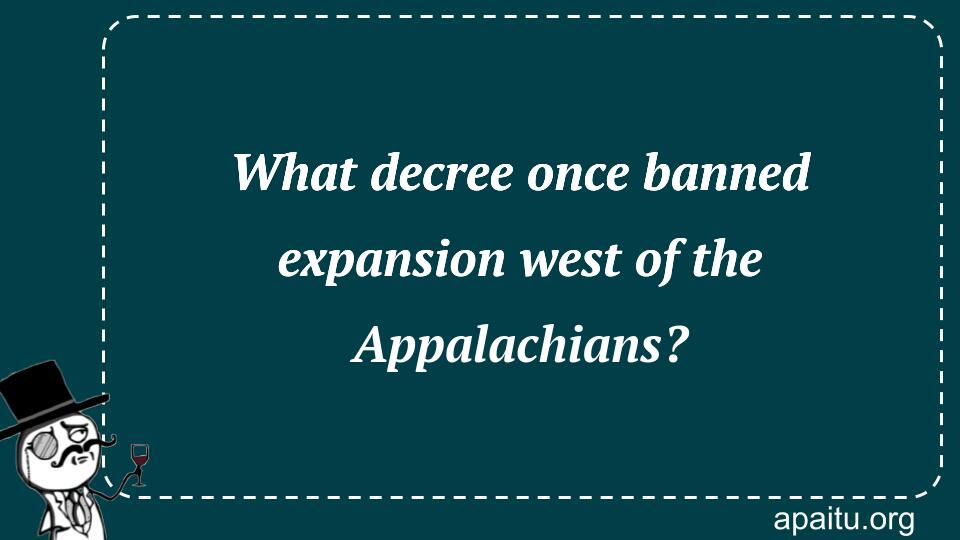Question
Here is the question : WHAT DECREE ONCE BANNED EXPANSION WEST OF THE APPALACHIANS?
Option
Here is the option for the question :
- Proclamation of 1763
- Proclamation of Rebellion
- The Act of Settlement
- Royal Decree of Graces
The Answer:
And, the answer for the the question is :
Explanation:
Before the Appalachian Trail existed, King George III issued the Royal Proclamation of 1763, which prohibited Anglo-American colonists from expanding west of the Appalachians. The British administration was concerned that expanding into Native American and French-owned territory might result in costly strife. The British government was also concerned that colonists would become less reliant on British trade as a result of expansion.

The Proclamation of 1763 stands as a historic decree that once banned expansion west of the Appalachians. This significant proclamation, issued by the British government in the aftermath of the French and Indian War, had far-reaching implications for the American colonies and the indigenous peoples inhabiting the western territories. In this article, we will explore the details and consequences of the Proclamation of 1763, shedding light on its impact on colonial expansion and its role in shaping the early history of the United States.
The Proclamation of 1763 was a response to the British government’s desire to maintain control over the newly acquired territories following their victory in the French and Indian War. The conflict, which took place from 1754 to 1763, saw the British forces, supported by colonial militias, triumph over the French and their Native American allies. With this victory, the British found themselves in possession of vast territories in North America.
In an effort to avoid conflicts with Native American tribes and stabilize the region, the British government issued the Proclamation of 1763. The proclamation drew a boundary line along the crest of the Appalachian Mountains, prohibiting colonial settlers from venturing westward beyond this line. The intention was to establish a buffer zone between the American colonies and the Native American territories, reducing the potential for clashes and ensuring British control over the western lands.
The Proclamation of 1763 faced opposition and resentment from the American colonists who had fought and sacrificed during the French and Indian War. Many colonists saw the western lands as an opportunity for new settlements, expansion, and economic growth. The proclamation, in their eyes, restricted their freedom and limited their prospects for land ownership and prosperity.
Colonial resentment toward the Proclamation of 1763 was further fueled by the presence of British troops stationed in the newly acquired territories. The British government deployed soldiers to maintain order and enforce the proclamation, which only deepened the colonists’ perception of British oppression and infringement upon their rights.
The proclamation also had significant implications for Native American tribes. While the British government intended to protect Native American lands and prevent further encroachment by colonists, the proclamation did not adequately address the complex relationships and land rights of the indigenous peoples. It failed to consider the diverse and intricate tribal alliances, leading to tensions and conflicts between Native American tribes and both British and colonial forces.
the Proclamation of 1763 ultimately proved difficult to enforce. Colonial settlers continued to migrate westward, defying the proclamation’s restrictions in search of land and opportunity. This defiance and the subsequent conflicts between settlers and Native American tribes further strained relations between the British government and the American colonies.
The Proclamation of 1763 became a source of contention and contributed to growing discontent among the American colonists, fueling their grievances against British rule. The restrictions on westward expansion, coupled with other policies and taxes imposed by the British, ultimately set the stage for the American Revolution and the quest for independence.
In the long term, the Proclamation of 1763 had a lasting impact on the United States’ territorial expansion. While the proclamation was eventually disregarded and its restrictions lifted, it represented an early attempt by the British government to control the colonial territories and manage relations with Native American tribes. The tensions and conflicts arising from the proclamation played a significant role in shaping the attitudes and aspirations of the American colonists, ultimately contributing to the birth of a new nation.
the Proclamation of 1763 was a pivotal decree that banned westward expansion of the American colonies beyond the Appalachian Mountains. Intended to maintain control, minimize conflicts with Native American tribes, and stabilize the newly acquired territories, the proclamation faced opposition from colonists seeking opportunities for settlement and economic growth. Its enforcement, coupled with other British policies, fueled discontent and contributed to the growing desire for independence. The Proclamation of 1763 holds a prominent place in American history as a catalyst for the revolutionary spirit that would shape the future of the United States.